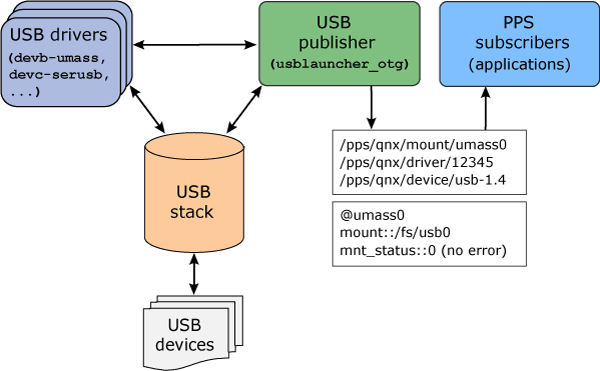The USB launcher service (usblauncher_otg) processes USB device attachments and detachments, launches drivers for communicating with devices, and publishes device information through PPS. The service can also force a re-enumeration of a device, by resetting it or by requesting it to disconnect and change its personality.
- io-usb-otg
- The USB stack, io-usb-otg, manages the USB bus and USB protocols through hardware controller drivers. The server monitors the bus and notifies the launcher service of device attachments and detachments, and supports USB host mode and USB device mode.
- Drivers for USB host mode
- When the USB stack is acting as a USB host, the launcher service can start drivers to communicate with different types of devices. The simplest example is when a user plugs in a mass-storage device, in which case, the service launches a devb-umass or devb-ustor driver to communicate with it; if a device has multiple partitions, one such driver manages all of the device's filesystems. Other drivers that may be used in host mode include mm-ipod, io-pkt with a USB Ethernet driver, devc-serusb, and others.
The launcher service doesn't support any On-The-Go (OTG) communication protocols designed to detect device attachments (ADP), manage power on a USB link (SRP), or negotiate the roles of two devices sharing a USB link (HNP). Instead, the service offers software emulation of OTG by allowing you to configure it to launch USB host mode drivers for the use cases outlined above and USB device mode drivers for devices for which end users want to project their display onto the target's HMI.
In this release, the USB launcher service can run USB device mode drivers only to support Apple CarPlay, in which the external device must act in the USB host role and the target system must act in the USB device role.
To use the associated launcher service features, you must install the Apple module, which contains the usblauncherotg-Apple.so plugin that handles this role-swapping, and load this module in the usblauncher_otg command line. To talk to any Apple devices, you must also install the Apple Device support package for the QNX Multimedia Suite.
Benefits of the USB launcher service
- Drivers can be started immediately
- Because the service launches the USB drivers, it knows immediately whether the target system has a suitable driver for a newly attached device. The service publishes the number of drivers that it will start for the device to the PPS device information object; this lets applications subscribed to this object know right away whether the device is supported.
- Automatic filesystem mounting
- The service can mount the filesystems of USB devices based on the mount rules stated in a file (by default, /etc/usblauncher/rules.mnt). It can also publish mount operation statuses to inform applications whether individual device filesystems were successfully mounted.
- Support for accessory mode
- Many smartphones now come with software that allows them to use another
system as an accessory, by projecting their UI onto that system's
display; end-users can then use the accessory to interact with
smartphone apps. For instance, if
you're building a vehicular infotainment system, you might want to let
vehicle occupants access smartphone features through the infotainment
system's display. Specifically, the USB launcher service can:
- Accept a command from a client application to ask an Android device to enable its Android Open Accessory (AOA) interface, so users can play media and access smartphone features from the target
- Check whether an Apple device supports the iPod Accessory Protocol version 2 (iAP2) and if so, request that the device switch to USB host mode, then launch a device mode driver on the target system; this setup supports CarPlay
Architecture

Figure 1. Basic architecture of USB launcher service
The USB launcher service relies on the USB stack to learn about changes in device states, as illustrated in Figure 1 (here, the arrows show information flow). When USB devices are attached or detached, they trigger hardware interrupts that the running stack (io-usb-otg) detects. When the stack learns that a device has been attached, it enumerates the new device and notifies USB launcher.
The USB launcher service queries the stack to retrieve the descriptors (properties) of any newly attached devices and compares these descriptors against the USB matching rules in its configuration file. When it finds a match, the service performs the specified follow-up actions. Often, this involves launching drivers and publishing device, driver, and mountpoint information through PPS.
To mount filesystems, the USB launcher service sends mount requests to the drivers that manage the USB device paths. The mountpoints requested by the service are based on the rules in the specified mount-rules file (for details, see the section on mounting filesystems).
Subscribed applications receive updates through PPS when device information changes, so they can learn when devices are reconfigured or removed.